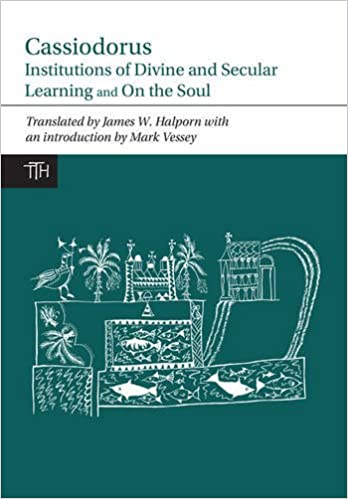Teaching as Trekking: What a Teacher Ought to Be
Many take up teaching because they want to make a difference in the world. They may hope to lead the way in culture change or in scientific advancement. Whether it’s a classroom teacher eager to pass on what he knows or a mother determined that her children will receive better than she did, teachers in all situations frequently begin with high hopes and great fervor. Because such motivations can wane over time, teachers, particularly Christian educators, should be grounded in good traditions and not merely good intentions. Teachers need to understand their role in order to fulfill it faithfully and well. According to the Christian education tradition developed in the early church by Augustine and Cassiodorus, a teacher’s responsibility is to act as a master of, a mentor in, and a member on the students’ journey toward wisdom and maturity.
Augustine and Cassiodorus agree that the teacher must be a master in the student’s journey toward maturity. A temptation of teachers throughout the ages has been seeing their authority as a position of power rather than service, but the Christian tradition demands the paradoxical: masters are servants. As a master of both knowledge and the process of gaining it, a teacher offers himself as a model to imitate.
Augustine is clear throughout On Christian Teaching that a teacher must possess what he would give and be master of the situation. Knowledge, ability, and virtue are not innate in humans; humans must be told even how to love. Scripture is the primary source of this instruction, but it is the job of teachers to expound upon that knowledge intelligibly and disciple students in it prudently. Because ignorance is humanity’s starting point, Augustine agrees with Cicero: “instructing is a matter of necessity”. Therefore, it behooves a teacher to communicate well so that the hearer is first instructed by the teacher’s knowledge and then moved to action by his eloquence. Augustine also asserts that it is the teacher’s duty to be master of the situation. A master is not controlling, but rather attentive and active as he solves “knotty problems”; additionally, he should be predictively addressing unspoken questions while not veering too far into speculation nor beyond his own learning. The portrait Augustine paints of the master teacher is of a dedicated and engaged tutor, one who has attained to at least the fifth stage of learning wherein compassion drives him to strenuously occupy himself with love of his neighbor, his student. Truly, love motivates his eloquence and he masters his own expression to benefit his hearers, not himself.
Cassiodorus propounds in Institutions on Divine and Secular Learning a different perspective on master teachers. Masters are primarily found in books. Thus, Cassiodorus allows a teacher to teach not only when physically present, but also through writing. Thus, in Cassiodorus’ model, a book teaches as much as a person instructing orally. Such textual teachers are vital precisely because masters are needed and not always bodily available. Through texts, a teacher can instruct beyond his own space and time and a student can learn from actual masters. This position demystifies and settles in humility the role of an ordinary classroom or home teacher; most teachers will direct their pupils to texts as masters rather than teach from their own counsel. Cassiodorus’ own approach exemplifies this humility, as well as his advice that “the practice of ordinary teaching” should inculcate a love and habit of reading, not to set oneself up as an authority and thus “rashly seek after those things which are beyond us.” Yet this is not an excuse for a teacher to be ignorant. A teacher, whether textual or relational, ought to engage in “the most difficult problems by systematic reasoning.” Even when not the source of knowledge, a teacher must still guide the program of instruction and oversee progress in virtuous living.
From both sources it is plain that a teacher can be a master without knowing everything or being the source of all instruction. The master should know what needs to be learned and direct his students, always guiding toward the authorities of Scripture and tradition.
Part of being a master of the learning process is discipling the student. Wisdom must come alongside and direct a young person’s growth into maturity and responsibility. A teacher ought to serve as a mentor, participating personally in the student’s development with eloquence and enthusiasm. As a mentor, a teacher is to be interested and invested in the student’s process of learning.
Augustine sees teaching as intensely personal and relational. The teacher’s eloquence ought not be manipulative, but rather attractive and instructive. Instead of fan clubs, the goal is to create participants, people whose loves are ordered to God and revealed truth. A mentor wants to help his students learn for themselves. A teacher does not work to keep men dependent on himself. Rather, he frees them to attain truth and wisdom independently. Although charisma is often associated with those who draw their own following, it can also be used wisely in a mentorship to attract the students to knowledge, understanding, and virtue. A student in this model learns to love the truth the teacher communicates more than the man. The teacher’s own rightly ordered love becomes contagious in his interactions with his students. And this contagion is not spread haphazardly or passively. As a mentor, the teacher must notice when his students have forgotten and need reminding, when they have questions and need answers, when they drift and need rousing. By following the example of eloquence and enthusiasm evident in the teacher’s life, the student is led not to hero-worship, but to truth and imitation.
Although Cassiodorus primarily refers to writings as teachers, yet he recognizes the value of mentorship and knows books alone cannot provide it. When listing types of understanding and how to arrive at them, he states, “seek frequent discussion with learned elders.” Conversation is a valuable and vital element of education, particularly when conducted with those more experienced and knowledgable. Praising the teaching he received from the abbot Dionysius, Cassiodorus commends dialogue, questioning, and reasoning as ideal forms of teaching. When, in various places, Cassiodorus advises his disciples to make annotations and commentary on authoritative texts, he sets forth the role of teachers: to take knowledge and make it understandable to others. A teacher, whether he’s writing a book or presenting wisdom gained from a book, transmits knowledge and a way of life to those in his care. The goal of teaching, whatever the source, is conformity of life to truth and holiness and learning that “lights the interior eye.” Of utmost importance to Cassiodorus is that “none be cut off from our zeal for reading,” but rather more and more be introduced to it. Cassiodorus’ teachers are to raise up readers and seekers of truth, not loyal followers.
Coming alongside students as mentors highlights the necessity that the teacher also be a member of the community of learning. Augustine and Cassiodorus also envisioned teachers being members of the students’ journey; that is, they recognize they are brothers laboring together toward a common aim: Christ’s kingdom in glory.
Learning from and alongside other people results in what Augustine calls an “intermingling” in love, causing both teacher and learner to be united as members one of another. He makes it clear that a teacher’s need to receive sound teaching is not over. Christians ought to see learning as a “trek,” a “voyage to our homeland,” which doesn’t end until we arrive at that homeland: Glory. In fact, the last line of On Christian Teaching reminds readers that Christian teaching is for both students and teachers. Although a particular teacher might only be involved in a particular student’s life for a fragment of his education, yet while he is involved he is not as a wholly other creature; he is a brother in Christ traveling the same road as his student and in need of the same nourishment.
Both Augustine and Cassiodorus blur the line between teachers and students. Cassiodorus commends teachers maintain their “zeal for reading” and study Scripture repeatedly and constantly. Those who teach do not become complacent or self-satisfied in the learning they possess, but rather experience “an ever-increasing desire” and a “glorious hunger.” Such an attitude about learning keeps them engaged with their students and the material, preventing torpor and boredom. His admonition to harken to sacred and secular learning as well as exemplars who have gone before addresses teachers. It is both the admonition and example those teachers are to be passing on and the practice they are to maintain. With wonder and worship, Christian teachers and students ought to delight in contemplating the Creator and his creation.
To those in a teaching position, both Augustine and Cassiodorus commend continual reading and submission to Scripture, tradition, and authorities. Both men instruct others in the very thing they themselves continue to practice: learning for growth in virtue. A teacher is not much different than the taught. United in a common end and a common savior, the relationship between teacher and student is grounded in love and humility, where arrogance and pride have no place. On the journey, teachers continue to learn while inviting their students to participate, showing them the tips and tricks of traveling. They help the less experienced gain steady footing, build endurance, and keep on the right path. To do this well, a teacher be a master directing the way, a mentor guiding the relationship, and a member uniting the body of Christ.






